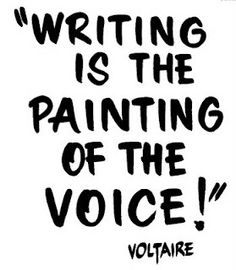English
St Chad's English Curriculum Intent, Implementation and Impact statement
Our Vision for Reading and Writing
At St Chad's we aim to offer and deliver an exciting, innovative English Curriculum which fosters and promotes a love of reading and writing that will equip all learners to be lifelong readers and writers. This will ensure an avid love of reading and nurture curiosity to further engage with the world around them. All of our learners are entitled to being shown the illicit skills for reading, which opens-up the gateway to learning across all curriculum areas. All children are entitled to a wealth of reading experiences, which will start with exposure to quality text from Nursery starting points. We will develop all children’s written, oral communication and creativity. We aim to fully support all children in their learning of English, through providing a rich creative curriculum that allows for varied cross-curricular English opportunities and access to the skills and knowledge needed to become fluent confident readers and writers. ' We use the term Sticky Knowledge’, which is knowledge that will stay with us forever. In other words, it is when an alteration has happened to our long-term memory.
Reading Statement of Intent - We aim to create Fluent, Passionate Readers
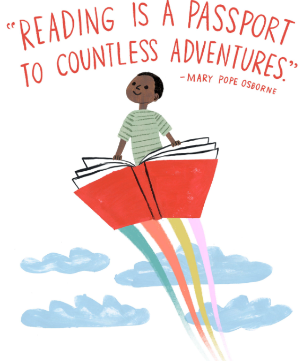
We understand how important it is for our pupils to leave St Chad's, as fluent readers who can understand texts which are put in front of them and have a drive for reading for pleasure. Our belief is that the teaching of reading is integral to a child’s understanding and appreciation of the world around them; a platform that allows our children to see beyond what they know, share in cultural experiences and develop the vocabulary they need to effectively express themselves. We also understand how important it is for our pupils to love books and have therefore put together a carefully crafted curriculum to ensure that the reading journey our pupils take with us is an enjoyable one and prepares them for the next stage in their education. Sticky knowledge is effectively knowledge that will stay with us forever! Our reading curriculum is carefully planned with clear and coherent learning sequences that progress towards clearly defined end points.
Our passion for reading is shared by many inspirational people and we believe:
"Reading is important, if you know how to read, then the whole world opens up to you." Barack Obama.
"The more that you read, the more things you will know. The more that you learn, the more places you'll go." Dr Seuss.
"If you are going to get anywhere in life, you have to read a lot of books." Roald Dahl.
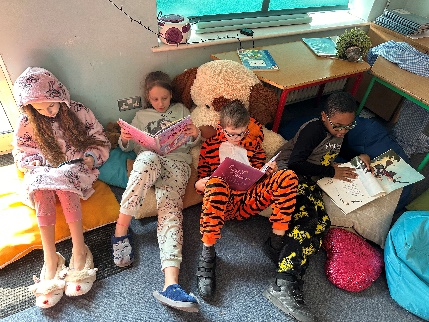
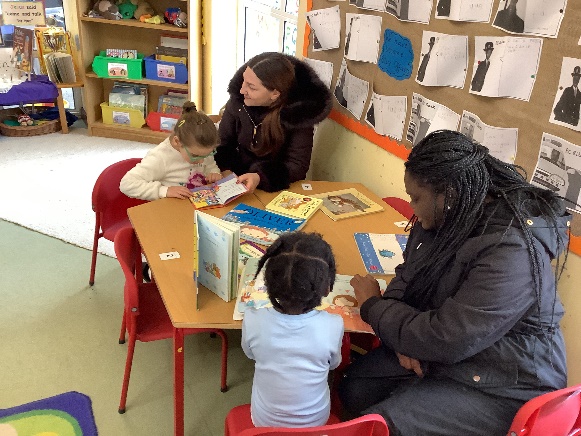
All teachers and staff will model reading aloud with enthusiasm and passion, ensuring an effort is made to bring the text to life, as part of our whole school reading approach. Our intended impact is that children will become fluent and confident readers with a deep level of comprehension. Our children will all value that being an avid reader promotes knowledge and love of learning. Our staff aim to raise the aspirations of every child regardless of gender, ethnicity, family background, first language, achievement-based starting points and SEND, opening their eyes to new opportunities and cultivating their development, so all become excellent readers, writers and communicators.
We aim to expose our children to literary success through introducing them to successful authors, illustrators and storytellers by celebrating reading across our school, promoting and providing a reading-rich environment where authors are celebrated, and our children are inspired through our choice of text and quality oracy by our teachers and staff. All children will read fluently with good comprehension, appropriate expression and intonation. We aim to support parents in developing the skills to build a home library, a social reading space to promote reading at home. Our children will leave St Chad's with all the necessary English skills and knowledge required to lead a successful and fulfilling life.
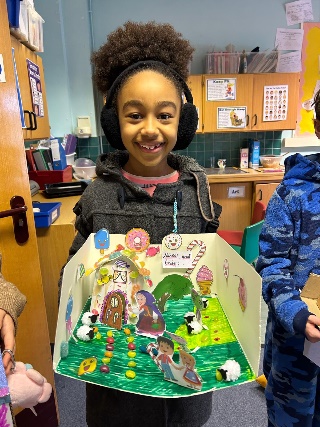
Implementation Statement
Reading
Reading is a key tool for life. Teaching children to become excellent readers is a key and exciting part of what we do at St Chad's. We have lots of opportunities for reading exciting books and encourage children to read a variety of classic and modern fiction, non fiction, poetry magazines and children’s newspapers. Reading is embedded across the foundation subjects and is used to research and gain knowledge in all areas across the curriculum. This allows our children to read widely and increase their vocabulary.
St Chad’s prioritises language and literacy, and therefore we drive the teaching of early reading skills right from Nursery across EYFS and KS1. We ensure the teaching of reading, using the Unlocking letters and sounds scheme and systematic synthetic phonics programme is the core purpose of Nursery and Reception and Year 1.
We value how important and essential high-quality continued professional development (CPD) is for our staff, and we ensure that all EYFS and KS1 teachers, teaching assistants receive regular training. This is vital in keeping all those involved in helping children to read in line with current theory and practice.
We have further improved provision by updating our guided reading and individual reader texts by purchasing the Unlocking Letters and Sounds scheme, which is decodable texts for children to read at school and home. We use the Unlocking Letters and sounds phonics scheme daily across EYFS and KS1. All pupils receive an hour of English lessons in the morning. This is a mixture of learning about reading, writing and speaking and listening, and includes a variety of text types and genres. Many of our texts are those recommended by the Centre for Literacy Primary Education (CLPE) and we have adapted the Power of Reading Project across the school. These texts are selected to show progression across each year group and follow sequenced coverage of specific genres which are used to inspire writing.
Reading for pleasure is embedded into our curriculum. All classes have a timetabled slot where a class book is read, as a focal point each day from Reception to Year 6. Teachers read with specific groups through guided reading sessions and whole class guided reading is offered twice-weekly as a minimum, allowing time for the core skills of comprehension to be explored and discussed. Teachers choose core texts to read to their classes and incorporate these texts into their English lessons. We use a range of reading comprehension materials to ensure these skills are developed within our reading lessons.
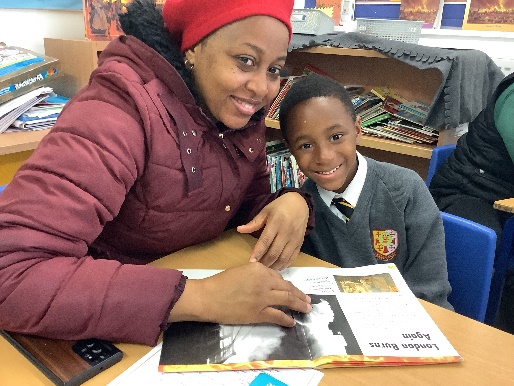
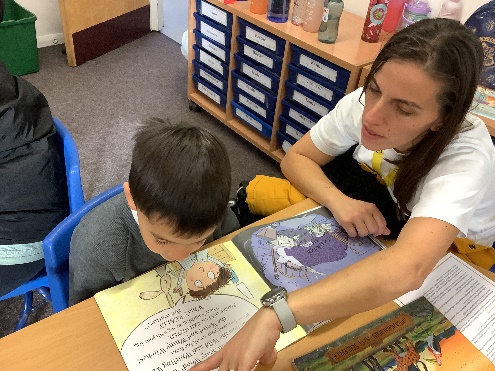
Our children visit our local library in South Norwood with their classes and are encouraged to take part in the Summer Reading Trail at the library during the holidays. We run a busy, fun-filled Book Week each year, which includes storytelling, competitions, book buddies, reading breakfast, reading afternoon tea, DEAR, the annual Book Fair and, of course, the ever-popular dressing up. We raise commission from our Scholastic Book Fairs, allowing us to continually invest in quality reading materials for our children.
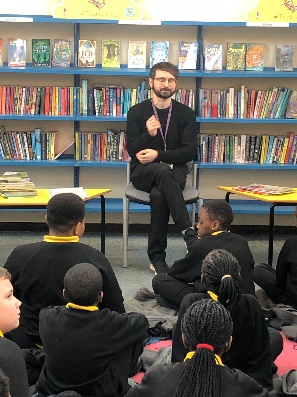
Parents are encouraged to read with their children daily at home. We follow the Unlocking Letter and Sounds phonics reading scheme. Children are also able to choose reading materials to share at home and move onto chapter books as they increase in confidence and fluency. Parents and staff are supported in how to encourage book talk, enabling children to talk their way towards deeper comprehension through drama, art, music, discussion and debate.
Through half-termly pupil progress meetings, teachers and SLT track attainment and progress in reading. Regular phonics assessments are vital in helping teachers to identify progress, as well as any gaps which need to be addressed. Teachers then target particular children, offering them extra 1:1 reading time or small group reading skill/phonics intervention. We use the NFER reading tests to ascertain formative information about each child’s attainment and progress, enabling teachers to adjust their planning and the support they provide as necessary. All data is used purposefully to put appropriate measures into place which help to impact on pupil progress. Formal Assessment in Reading, takes place regularly, with formal SAT Tests in Year 2 and Year 6.
We aim to create
Organised, Imaginative, Writers
Writing Statement of Intent
At St Chad’s we understand how important it is for children to leave primary school as effective writers, who can write for a range of purposes. We also understand how important it is for our pupils to have a love of writing. We have therefore created a carefully thought-out curriculum, to ensure the writing journey our pupils experience is a successful one and prepares them for the next stage of their education.
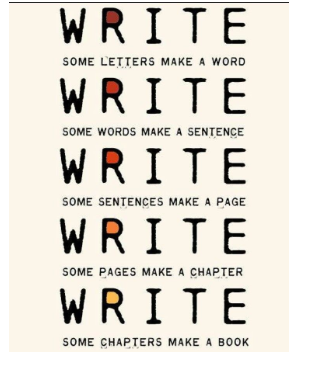
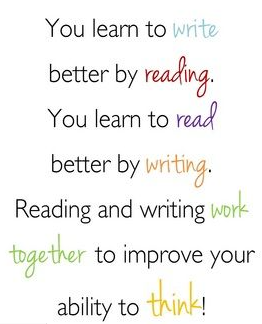
Implementation Statement
Writing
Writing is an essential part of our curriculum, and we take great pride in the high standards of writing in our school. We provide opportunities for inspiring great writing across the curriculum. Through excellent teaching and dedicated focused support, children are able to make aspirational levels of progress.
In EYFS, children learn how to hold a pencil properly and begin to form letters, words and sentences through a series of purposeful and fun writing tasks.
At St Chad’s we either link our writing context to our whole class text or our curriculum topics, finding real-life reasons for children’s writing to enthuse them with purpose. We strive to create a sense of enjoyment around writing and encourage children to see themselves as authors. Teachers talk to the children about their targets, helping them take ownership of their work and providing them with effective tools they need to make rapid progress. Children’s writing is celebrated in many ways, with writing displayed in classrooms and key areas, so the children feel that their writing is valued.
Each week, pupils plan for writing using a range of strategies suitable to the task. Writing is planned around a whole book using the CLPE Power of Reading / Power of Art approach. Children are given time after writing to proofread and edit any work on their own or alongside a partner. Children are trained to check their work carefully and accurately using a dictionary or thesaurus to help.
We have a school handwriting policy and teachers set high expectations with regard to the children's presentation of work. Handwriting is taught regularly and systematically, with extra intervention support provided where necessary.
Children are taught spelling weekly. Lessons include investigative spelling games and incorporate the use of dictionaries in the teaching of new spelling patterns, rules and irregularities.
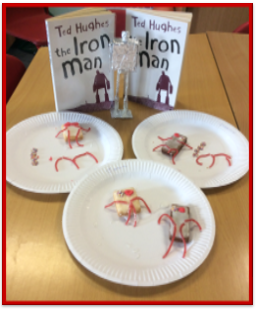
Impact statement:
By the time children leave St Chad's, they are competent readers, who have a thirst for reading a range of genres, including poetry, and who participate in discussions about books, including evaluating an author’s use of language and the impact this can have on the reader. They are able to recommend books to their peers. They can also read books to enhance their knowledge and understanding of the world and all subjects within the curriculum, allowing them to communicate their research to a wider audience.
As a result, we have a community of enthusiastic readers and writers who enjoy showcasing their developing literacy knowledge and skills. They are confident to take risks in their reading and writing, and love to discuss and share their ideas.
